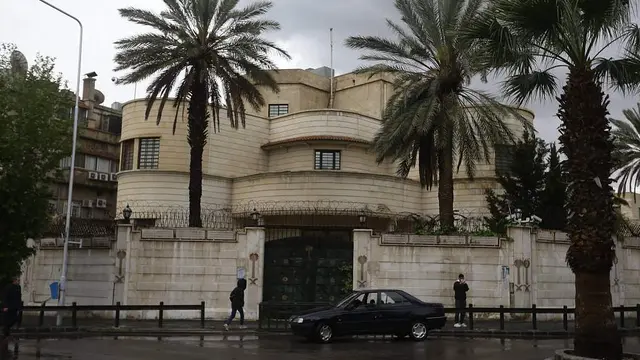Syria's President Bashar al-Assad cemented his return to the Arab League (AL) Tuesday when leading Middle Eastern power Saudi Arabia, which long supported Syria's opposition, said it will reopen its diplomatic mission in Syria.
The restoration of diplomatic ties, later confirmed by Damascus, came more than a decade after Riyadh withdrew its representatives during Syria's civil war, and two days after Syria was readmitted into the AL.
The kingdom "has decided to resume the work of its diplomatic mission in Syria," Riyadh's Foreign Ministry said in a statement carried by the official Saudi Press Agency, saying it would seek to "develop joint Arab action."
Syria's SANA news agency also said "the Syrian Arab Republic has decided to resume the work of its diplomatic mission in Saudi Arabia," quoting a Foreign Ministry source.
Saudi Arabia will host the pan-Arab bloc's next summit on May 19.
Assad had been politically isolated in the region since Syria's war began, but a flurry of diplomatic activity has been underway in recent weeks after a decision by Saudi Arabia and Iran, a close ally of Damascus, to resume ties shifted the political landscape.
Three weeks ago, Assad met in Damascus with Saudi Foreign Minister Prince Faisal bin Farhan, the first such visit since the war broke out in 2011. During their meeting, Assad and Prince Faisal discussed steps to "achieve a comprehensive political settlement that contributes to Syria's return to the Arab fold," the Saudi Foreign Ministry said.
Earlier in May, Iranian President Ebrahim Raisi embarked on a landmark visit to Syria, the first for an Iranian president since the Syrian war broke out in 2011.
On Sunday, the AL welcomed back Syria's government and agreed on the necessity to intensify efforts to "help Syria out of its crisis."
Senior Chinese diplomat Wang Yi said China welcomes Syria's return to the big family of the Arab League while meeting with a delegation led by Mohammad Bagher Zolghadr, secretary of the Expediency Discernment Council of Iran, in Beijing on Tuesday.
China supports countries in the Middle East in upholding strategic independence and taking their destiny into their own hands, said Wang, director of the Office of the Foreign Affairs Commission of the Communist Party of China (CPC) Central Committee and also a member of the Political Bureau of the CPC Central Committee.
The United States and Britain said they still opposed relations with Assad but would work with Arab states that are re-establishing relations.
Assad hopes normalization with wealthy Gulf states can bring economic relief and money for reconstruction, as broader international funding remains elusive without a United Nations-backed political settlement to the conflict.
Syria's return to the bloc is "the beginning not the end of the issue", said Ahmed Aboul Gheit, head of the 22-member Arab League, noting it was up to individual countries to decide whether to resume ties with Damascus.
At present, large parts of Syria's north remain outside government control and no political solution has yet been reached to the conflict.
(CGTN)
 简体中文
简体中文

